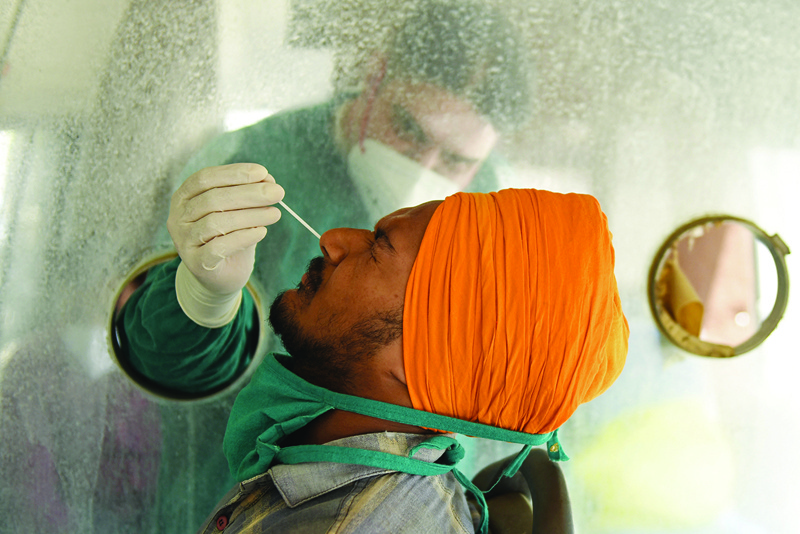 AMRITSAR: A health worker collects a nasal swab sample from a man to test for COVID-19 in a mobile testing van yesterday. - AFP
AMRITSAR: A health worker collects a nasal swab sample from a man to test for COVID-19 in a mobile testing van yesterday. - AFPGENEVA: The UN chief yesterday declared the world "at war" against COVID-19, as India's death toll crossed 300,000 and Japan opened its first mass vaccination centers - just two months before the start of the Olympics. At least 115,000 health and care workers have died from COVID-19 since the beginning of the pandemic, the WHO chief said yesterday, calling for a dramatic scale-up of vaccination in all countries.
United Nations Secretary-General Antonio Guterres urged governments to apply wartime logic to stark inequalities in the response to the pandemic, warning the crisis was far from over despite rapidly advancing vaccination rollouts in wealthy parts of the world. "Unless we act now, we face a situation in which rich countries vaccinate the majority of their people and open their economies, while the virus continues to cause deep suffering by circling and mutating in the poorest countries," he said.
Vaccine sharing, strengthening the WHO and adopting a pandemic treaty were among proposals from world leaders yesterday on how to halt the COVID-19 pandemic and prevent future health catastrophes. Deadly outbreaks in India, Brazil and elsewhere have pushed the global death toll past 3.4 million, even as rich countries such as the United States and Britain have eased restrictions.
India has witnessed horrific scenes in recent weeks with severe shortages of oxygen at hospitals and crematoriums overwhelmed, although the number of new daily infections has fallen in big cities. However, experts say the real numbers of deaths and infections in India - fueled by a new coronavirus variant and "superspreader" events such as mass religious festivals - are probably much higher than the official figures.
"We are seeing the bodies along the river Ganges which don't seem to be recorded as COVID deaths but are very likely to be COVID deaths," Ashoka University biology professor Gautam Menon told AFP. India has administered close to 200 million vaccine shots, but experts say the program needs to be ramped up significantly to bring the virus under control.
The brutal wave has been accompanied by the emergence among coronavirus patients of thousands of cases of the usually rare infection mucormycosis, or "black fungus". The government has given figures between 5,424 and 8,848 for the number across India. It usually records fewer than 20 cases a year.
Another Asian country that has faced criticism over a slow inoculation rate is Japan, where the first mass vaccination centers opened yesterday. Japanese authorities are trying to speed up their vaccination drive with just two months until the postponed Tokyo Olympics begin. Just two percent of Japan's 125 million population has been fully vaccinated, compared with around 40 percent in the United States and 15 percent in France.
Speaking alongside Guterres at the World Health Organization's main annual assembly in Geneva, WHO chief Tedros Adhanom Ghebreyesus said he wanted 10 percent of every country's population vaccinated by September. "The pandemic is not over," he said, pointing out that just during the first hour or so of the assembly, nearly 1,000 people had died worldwide from COVID. "This is not the time for incremental improvements or tinkering at the edges," he told the assembly. "This is the moment for bold ideas, bold commitment and bold leadership, for doing things that have never been done before."
The WHO "must be the heart, the compass, of our global health approach," French President Emmanuel Macron told the assembly. "This organization must be robust in times of crisis, it must be flexible enough to react to emergencies," he said. German Chancellor Angela Merkel meanwhile said "the priority must be to enable the world to respond to a pandemic threat as rapidly as possible," and voiced support for the creation of a global health threats council.
Tedros also paid tribute to the estimated 115,000 health and care workers who have died from COVID-19 since the beginning of the pandemic. "They have saved countless lives and fought for others who, despite their best efforts, slipped away," he said, describing the medical workers lost to the pandemic as having paid "the ultimate price in the service of others".
He said many medics have felt "frustrated, helpless and unprotected, with a lack of access to personal protective equipment and vaccines". "The number of doses administered globally so far would have been enough to cover all health workers and older people if they had been distributed equitably," Tedros added. More than 75 percent of all COVID vaccines have gone to just 10 countries.
The rollout remains painfully slow in Brazil, one of the hardest-hit countries in the world. Its far-right president Jair Bolsonaro has been widely condemned for his coronavirus skepticism and pandemic management, with Brazil's death toll topping 450,000. But he has remained defiant, leading a motorbike rally through Rio de Janeiro on Sunday as throngs gathered to cheer him on despite the coronavirus risk. - AFP










